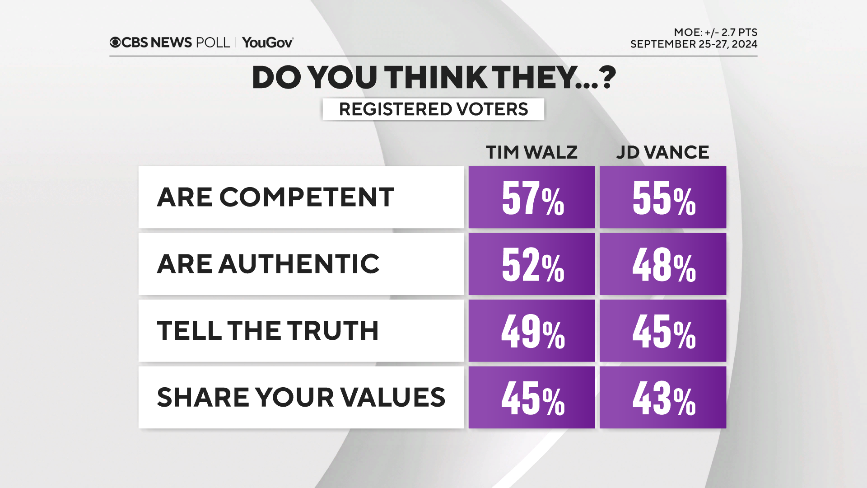Most voters say they’ll tune in to watch Tuesday night’s vice presidential debate and that they’re looking to learn something about the candidates, even as many also say — perhaps unsurprisingly in this partisan environment — that they’re watching to root for their side or to see if the other side makes a mistake.
Part of any vice presidential nominee’s role is to rally the base, and both Minnesota Gov. Tim Walz and Ohio Sen. JD Vance head into Tuesday’s debate, which will be moderated by CBS News, in good position within their own parties: a big majority of Democrats think Walz makes their ticket better, and most Republicans think Vance adds to their ticket, too.
Walz and Vance are each described as generally “competent” by most voters, but the debate also sets up a challenge for both. Neither has yet convinced a majority of voters about an essential part of the job: that they’d be qualified to be president if needed.
In the eyes of Democrats, Walz comes in with some momentum: their enthusiasm for Walz has grown a bit since he was selected. Vance’s has held steady, and he elicits more enthusiasm from MAGA Republicans than from non-MAGA Republicans.
While there’s plenty of partisan cheering, big majorities of debate watchers will be looking to learn something about the candidates, and specifically, a quarter say they’ll be looking for something that helps them make a voting decision. That could of course be solidifying a choice, given how close the contest already is, but it does imply the debate could have a substantial impact.
And voters want to hear the candidates’ views on the economy and immigration and more broadly, their views on what America stands for. In contrast, there is little desire to hear details about their personal lives and families or comparisons of their military records.
Even fewer say they want to hear Walz and Vance criticize each other.
Walz is seen as more of an asset to the Democratic ticket than Vance is to the Republican ticket. Voters overall give Walz the advantage on this, and Democrats are more apt to say Walz makes their own ticket better than Republicans are apt to say the same of Vance.
Another partisan split can be seen on how the candidates handle themselves, with Democrats and Republicans each favoring their own candidates and disliking their counterparts.
And another key measure to watch: much as the presidential candidates have shown a much-discussed “gender gap” in vote preference, so do the vice-presidential candidates bring out something of a gender gap of their own: women voters are 10 points more likely than men to like Tim Walz personally.
For men it’s the reverse, and they’re more likely than women to say they like Vance.
One thing voters largely agree on is that the stakes are high: two-thirds of voters feel that voting in this election matters more than it did in the presidential election four years ago.
This CBS News/YouGov survey was conducted with a representative sample of 2,011 registered voters nationwide interviewed between September 25-27, 2024. The sample was weighted according to gender, age, race, and education based on the U.S. Census American Community Survey and the U.S. Census Current Population Survey, as well as past vote. Respondents were selected to be representative of registered voters nationwide. The margin of error for registered voters is ±2.7 points.
The post Views of Vance, Walz ahead of debate — CBS News poll appeared first on World Online.

